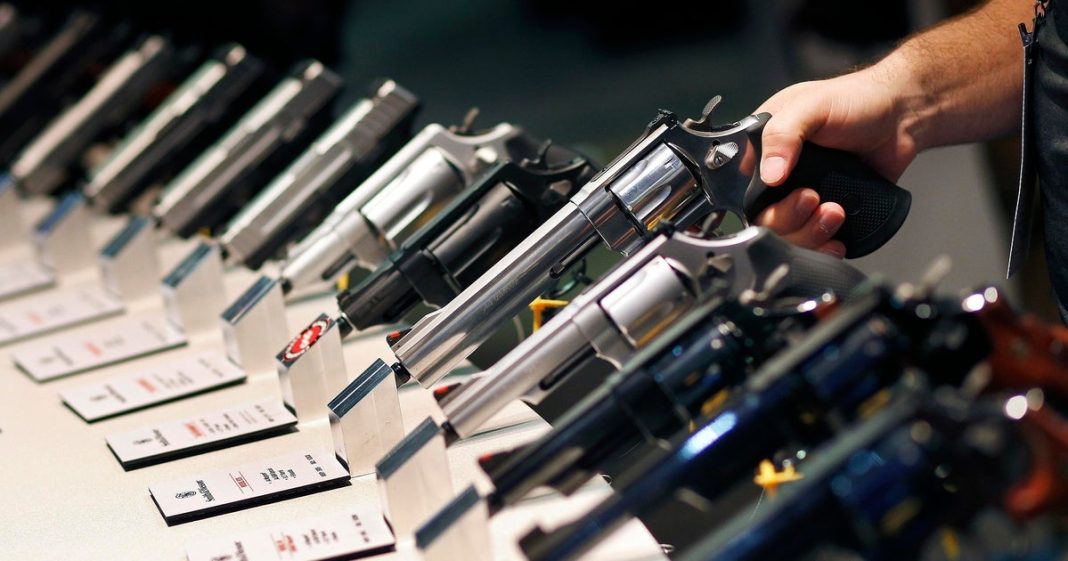Washington — The Supreme Court on Thursday blocked the Mexican government’s lawsuit against major U.S. gun manufacturers, delivering a win for the firearms industry in a test of a federal law that shields them from civil suits.
The high court unanimously rejected Mexico’s arguments that its effort to hold firearms makers accountable for the violence wreaked by drug cartels armed with their products should proceed because it satisfied an exception to the liability shield provided through the Protection of Lawful Commerce in Arms Act, or PLCAA.
In the case known as Smith & Wesson Brands, Inc. v. Estados Unidos Mexicanos, Mexico had argued that gun manufacturers are knowingly aiding and abetting the unlawful sale of their firearms to straw purchasers, who are trafficking them across the southern border to give to drug cartels.
But the justices said that because Mexico’s complaint does not plausibly allege that the gunmakers criminally aided and abetted retail dealers’ unlawful sale of weapons to Mexican traffickers, it is barred by PLCAA. Justice Elena Kagan delivered the opinion for the court, writing that Congress enacted the law to prevent lawsuits like Mexico’s.
“The predicate exception allows for accomplice liability only when a plaintiff makes a plausible allegation that a gun manufacturer ‘participate[d] in’ a firearms violation ‘as in something that [it] wishe[d] to bring about’ and sought to make succeed,” she wrote. “Because Mexico’s complaint fails to do so, the defendant manufacturers retain their PLCAA-granted immunity.”
David Pucino, legal director and deputy chief counsel at GIFFORDS Law Center, said that while the Supreme Court’s decision ends Mexico’s lawsuit against gun manufacturers, it doesn’t affect the ability of gun violence prevention groups from holding law-breakers accountable.
“The justices did not give the gun industry the broad immunity it sought. Instead, they reaffirmed that the victims of gun industry misconduct can hold lawbreakers accountable in court,” he said in a statement. “All survivors, in the United States, in Mexico, and anywhere else, deserve their day in court, and we will continue to support them in their fight for justice.”
Between 200,000 to 500,000 American-made firearms are trafficked into Mexico each year, a pipeline that’s become known as the “iron river.” Nearly half of all guns recovered at Mexican crime scenes are manufactured in the U.S., according to data from the Bureau of Alcohol, Tobacco, Firearms and Explosives.
As part of its efforts to stem the flow of guns illegally trafficked across the U.S.-Mexico border to arm drug cartels, the Mexican government sued seven of the biggest gunmakers in the U.S. and one wholesaler in 2021. It is seeking $10 billion in damages from the industry, as well as other forms of relief.
Mexico has argued that its suit fell under one of PLCAA’s exceptions, known as the predicate exception, because the gun manufacturers allegedly knew they were breaking the law by selling to known straw purchasers, and that violation led directly to Mexico’s injuries: the millions of dollars in damage to its military and property caused by cartel violence.
The law was passed with bipartisan support from Congress in 2005 and broadly provides a legal shield for gun companies from civil suits that seek to hold them liable for harms stemming from the criminal misuse of their products by another person.
A federal district court in Massachusetts dismissed Mexico’s suit in 2022 after finding that PLCAA “unequivocally” bars lawsuits seeking to hold firearms manufacturers liable for the actions of people using their products. The court also ruled that PLCAA’s narrow exceptions did not apply to the case.
But in early 2024, a panel of three judges on the U.S. Court of Appeals for the 1st Circuit revived Mexico’s lawsuit, concluding it fell under PLCAA’s predicate exception. That allows gunmakers to be sued if they knowingly broke the law, and if that legal violation led directly to Mexico’s injuries.
The appeals court found that the gun industry was “aiding and abetting” the unlawful sale of firearms to traffickers for cartels in Mexico, and that the trafficking of those guns has foreseeably forced the Mexican government to incur significant costs because of cartel violence.
The Supreme Court reversed the 1st Circuit’s ruling and found that Mexico’s complaint “stretches the bounds” of its caselaw.
The suit, Kagan wrote, repeatedly claims that gunmakers “treat rogue dealers just the same as they do law-abiding ones — selling to everyone, and on equivalent terms.” But Mexico, she said, could not plausibly allege that is taking place, in part because the manufacturers sell their products to middlemen distributors.
“A manufacturer of goods is not an accomplice to every unaffiliated retailer whom it fails to make follow the law,” Kagan wrote.
In a concurring opinion, Justice Clarence Thomas wrote that courts should in future cases more fully examine what constitutes the violation of state or federal law that would allow a lawsuit to fall under the exception to PLCAA’s liability shield. He suggested that the law requires not only a plausible allegation that a gunmaker has broken the law, but also a finding of guilt or liability in an adjudication regarding that violation.
“Particularly given PLCAA’s aim of protecting gun manufacturers from litigation, this issue warrants careful consideration,” Thomas wrote.
Justice Ketanji Brown Jackson also authored a concurring opinion, in which she wrote that Mexico is merely faulting the gun industry writ large for engaging in practices that legislatures and voters have decided not to prohibit.
The lawsuit, she said, “seeks to turn the courts into common-law regulators. But Congress passed PLCAA to preserve the primacy of the political branches — both state and federal — in deciding which duties to impose on the firearms industry. Construing PLCAA’s predicate exception to authorize lawsuits like the one Mexico filed here would distort that basic design.”
The case arrived at the Supreme Court while it was in its early stages. As the gunmakers’ appeal was pending, the district court dismissed six of the eight manufacturers from the case. The remaining companies are Smith & Wesson and Interstate Arms, a wholesaler.




